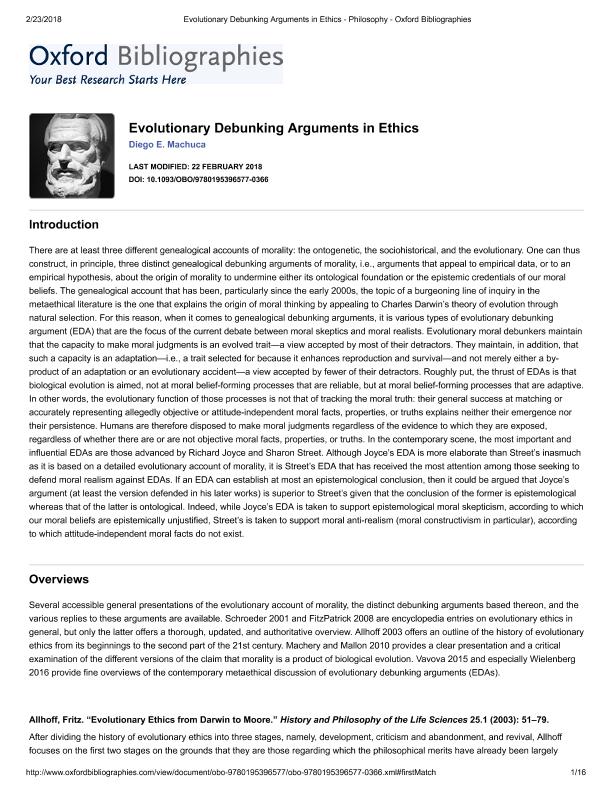Mostrar el registro sencillo del ítem
dc.contributor.author
Machuca, Diego Emanuel

dc.date.available
2021-07-07T18:32:34Z
dc.date.issued
2018-02
dc.identifier.citation
Machuca, Diego Emanuel; Evolutionary Debunking Arguments in Ethics; Oxford University Press; Oxford Bibliographies in Philosophy; 2-2018; 1-16
dc.identifier.issn
0268-1137
dc.identifier.uri
http://hdl.handle.net/11336/135677
dc.description.abstract
There are at least three different genealogical accounts of morality: the ontogenetic, the sociohistorical, and the evolutionary. One can thus construct, in principle, three distinct genealogical debunking arguments of morality, i.e., arguments that appeal to empirical data, or to an empirical hypothesis, about the origin of morality to undermine either its ontological foundation or the epistemic credentials of our moral beliefs. The genealogical account that has been, particularly since the early 2000s, the topic of a burgeoning line of inquiry in the metaethical literature is the one that explains the origin of moral thinking by appealing to Charles Darwin’s theory of evolution through natural selection. For this reason, when it comes to genealogical debunking arguments, it is various types of evolutionary debunking argument (EDA) that are the focus of the current debate between moral skeptics and moral realists. Evolutionary moral debunkers maintain that the capacity to make moral judgments is an evolved trait—a view accepted by most of their detractors. They maintain, in addition, that such a capacity is an adaptation—i.e., a trait selected for because it enhances reproduction and survival—and not merely either a by-product of an adaptation or an evolutionary accident—a view accepted by fewer of their detractors. Roughly put, the thrust of EDAs is that biological evolution is aimed, not at moral belief-forming processes that are reliable, but at moral belief-forming processes that are adaptive. In other words, the evolutionary function of those processes is not that of tracking the moral truth: their general success at matching or accurately representing allegedly objective or attitude-independent moral facts, properties, or truths explains neither their emergence nor their persistence. Humans are therefore disposed to make moral judgments regardless of the evidence to which they are exposed, regardless of whether there are or are not objective moral facts, properties, or truths. In the contemporary scene, the most important and influential EDAs are those advanced by Richard Joyce and Sharon Street. Although Joyce’s EDA is more elaborate than Street’s inasmuch as it is based on a detailed evolutionary account of morality, it is Street’s EDA that has received the most attention among those seeking to defend moral realism against EDAs. If an EDA can establish at most an epistemological conclusion, then it could be argued that Joyce’s argument (at least the version defended in his later works) is superior to Street’s given that the conclusion of the former is epistemological whereas that of the latter is ontological. Indeed, while Joyce’s EDA is taken to support epistemological moral skepticism, according to which our moral beliefs are epistemically unjustified, Street’s is taken to support moral anti-realism (moral constructivism in particular), according to which attitude-independent moral facts do not exist.
dc.format
application/pdf
dc.language.iso
eng
dc.publisher
Oxford University Press

dc.rights
info:eu-repo/semantics/openAccess
dc.rights.uri
https://creativecommons.org/licenses/by-nc-sa/2.5/ar/
dc.subject
MORALITY
dc.subject
EVOLUTION
dc.subject
DEBUNKING
dc.subject.classification
Otras Filosofía, Étnica y Religión

dc.subject.classification
Filosofía, Ética y Religión

dc.subject.classification
HUMANIDADES

dc.title
Evolutionary Debunking Arguments in Ethics
dc.type
info:eu-repo/semantics/article
dc.type
info:ar-repo/semantics/artículo
dc.type
info:eu-repo/semantics/publishedVersion
dc.date.updated
2021-07-05T14:43:34Z
dc.journal.pagination
1-16
dc.journal.pais
Reino Unido

dc.journal.ciudad
Oxford
dc.description.fil
Fil: Machuca, Diego Emanuel. Academia Nacional de Ciencias de Buenos Aires. Centro de Estudios Filosóficos "Eugenio Pucciarelli"; Argentina. Consejo Nacional de Investigaciones Científicas y Técnicas; Argentina
dc.journal.title
Oxford Bibliographies in Philosophy
dc.relation.alternativeid
info:eu-repo/semantics/altIdentifier/url/https://www.oxfordbibliographies.com/view/document/obo-9780195396577/obo-9780195396577-0366.xml
dc.relation.alternativeid
info:eu-repo/semantics/altIdentifier/doi/http://dx.doi.org/10.1093/OBO/9780195396577-0366
Archivos asociados
